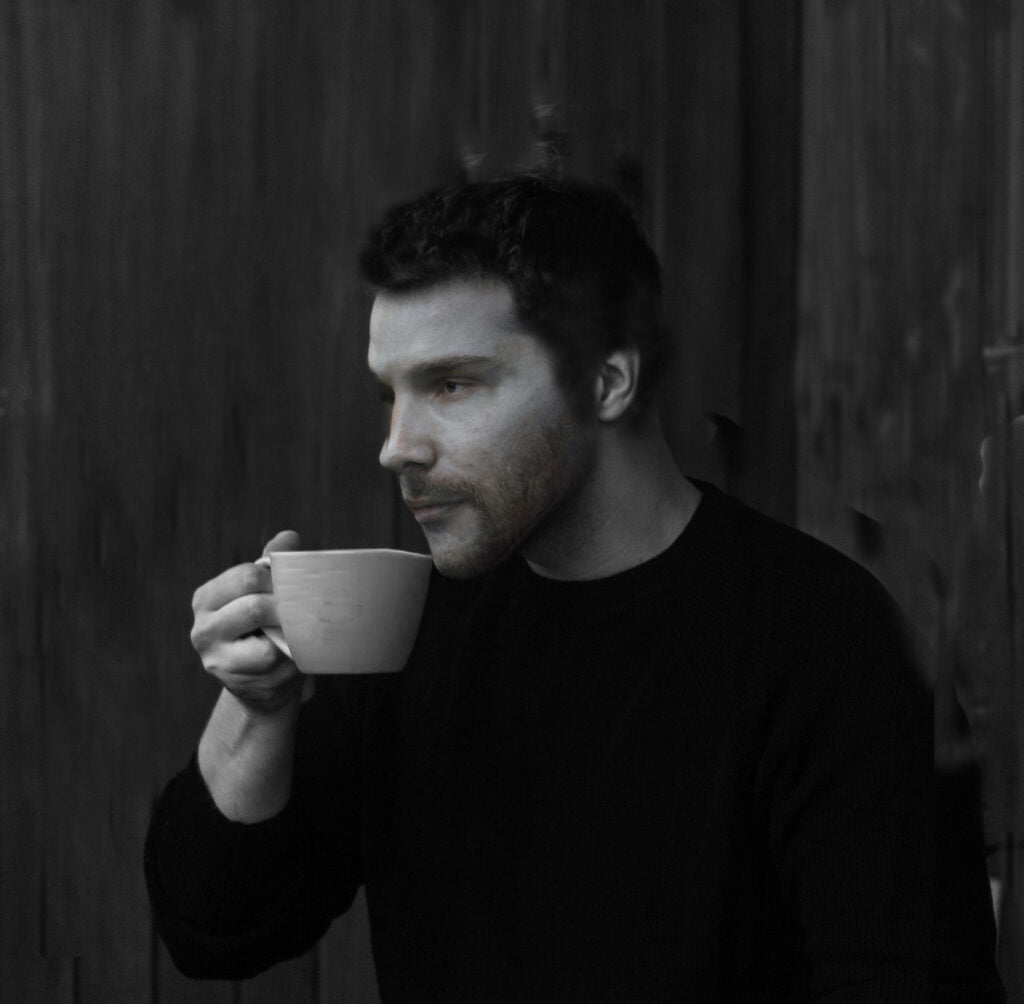So, you are a strong coffee lover? But don’t have very good barista skills and always end up with a weak or watery cup of coffee. I got you covered! In this article, I will share 8 tips to make your coffee stronger and bolder.
If you are not an expert at brewing and trying to make a strong coffee you often end up with a very bitter cup of coffee. That was also the case with me before but then I started learning and got to know that strongness and boldness have nothing to do with bitterness.
Key Takeaways
- Strong coffee is about a full, dense body – not just bitterness or caffeine level
- Use a higher coffee-to-water ratio – ideally 1:15 for drip coffee
- Choose a darker roast for bolder and full-bodied flavors
- Use fresh roasted coffee beans, ideally within 2 months of roasting
- Grind beans right before brewing to preserve freshness and flavor
- Select the right grind size – coarse for French press, medium for drip
- Brew with hot water between 195-205 degrees Fahrenheit
- Try different brew methods like French press or Turkish coffee
Although the taste of strong coffee will be a little more bitter than a weak one. But bitterness is mainly due to badly roasted coffee beans or it may arise because of over-extraction.
Bitterness is certainly not an ideal quality of coffee and is undesirable. And also, strong coffee doesn’t have to be rich in caffeine either.
So, what are the qualities of a strong cup of coffee? The number one quality of strong coffee is that it is thick and dense. It has a full body and it does not have watery flavors.
Now you know what a strong brew is? Let’s go through eight tips that will help you make a strong cup of coffee at home.
As an Amazon Associate, I earn commission from qualifying purchases.
8 Tips to brew stronger and Delicious coffee
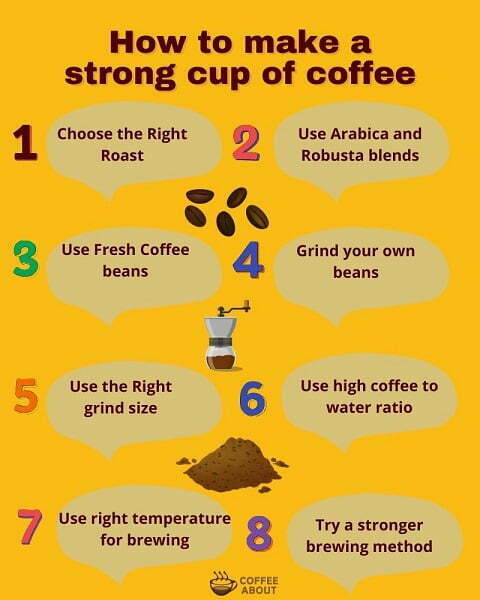
1- Choose the right roast
The roast profile plays a central role in shaping the flavor profile of coffee. Lightly roasted beans have delicate fruity and acidic notes, while these flavors gradually diminish as the roast degree darkens, yielding bolder and smoky tones.
Ideally, you have to try all types of roasts one by one and select the one that suits you the best.
For a stronger coffee, I suggest you go with a Dark roast as the longer roasting process caramelizes sugars, resulting in bolder, smokier, and often less acidic coffee.
But you may not like a dark roast as they are more bitter than a lighter roast. If you hate bitterness then I suggest you try medium-dark roast instead.
Secondly, preparing a perfect dark roast bean is not everyone’s cup of tea. The roaster must be an expert at it and I must say finding perfect dark roasted beans is very difficult. I Like Peets Major Dickason’s Dark Roast it’s perfectly smooth and strong.
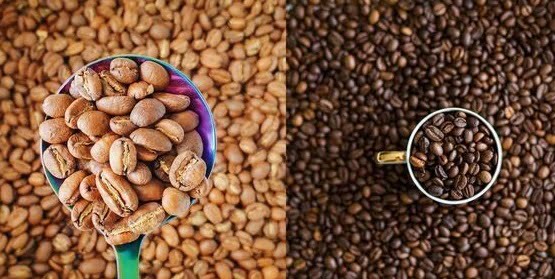
Read a Guide on Dark Roast vs Light Roast
2- Select the right type of coffee beans
Arabica and Robusta blends are a dynamic duo for a stronger coffee experience.
While Robusta beans may have a harsh reputation, they offer double the caffeine content of Arabica beans, making them a good choice for coffee lovers looking for a strong cup of joe.
The Italians have used Robusta in their espresso for generations! But too much Robusta can make coffee bitter and one-dimensional. Find a coffee blend that balances the strengths of both beans.
A well-crafted Arabica-Robusta mix can give you that high-octane kick yet balanced flavor for a mighty satisfying cup. I like using Lavazza Super Crema for Espresso, it really makes rich and tasty shots.
3- Use fresh coffee beans
Fresh coffee beans are paramount in brewing a potent, flavorful coffee drink.
I’ve noticed the flavor of coffee drops significantly once the beans sit around for too long after being roasted even if they’re stored properly.
I’d say the perfect window is to grind and brew within 2 months of the roasting date absolute max.
But ideally, I love grinding beans that were roasted in just the past month – their aroma is so vibrant and lively! Those super-fresh beans extract the fullest, most intense flavors possible.
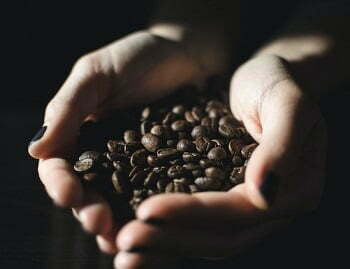
Also read: How to Store Coffee Beans
4- Grind your beans
Pre-ground coffee just can’t compare freshness-wise. Even the best-sealed pre-ground packs seem to lose that zing pretty quickly. It makes sense – with all that newly exposed surface area, those grounds oxidize and go stale so much faster.
So, if you want a fresh and strong cup of coffee never use pre-ground coffee (No matter how many promises the brand makes on the pack about freshness, it will not be fresh).
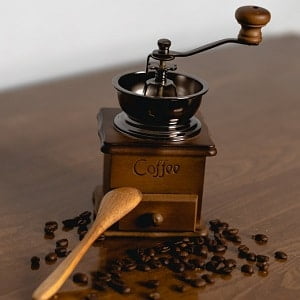
There is a simple rule of thumb for coffee aficionados, grind within fifteen days of roasting and brew within fifteen minutes of grinding.
5- Use the right grind size
Nailing the grind size is a secret weapon for a stronger and more balanced coffee drink.
Too coarse, and you’ll miss out on the strength; too fine, and you risk over-extraction, leaving a bitter taste, it’s all about finding the right balance.
Also, you can not use the same fine coffee grounds for every brewing method.
For example, fine grounds are perfect for making espresso shots but are not suitable for brewing French press or Drip coffee.
The grounds for French Press should be coarse, while drip coffee is best with medium grounds.
Generally speaking, shifting the grind size to 1-2 points on the finer side is a good idea for making a strong cup of coffee!
If you want to learn more about which grind size is perfect for which brewing method. Check out our Ultimate guide on coffee grind size.
6- Use a high coffee-to-water ratio
If you want a strong cup of coffee you have to use more coffee ratio – it’s that simple math that amps up the intensity.
With the higher concentration of coffee tasty oils and soluble compounds will extract into less water, and you will get a much thicker, richer, fuller-bodied cup every time.
Ideally, you have to experiment with different coffee ratios to find the best for yourself.
To make a stronger Pour Over Coffee, I use a 1:15 ratio of coffee grounds to water i-e for a regular 8 oz serving of coffee I use 17 grams of coffee grounds.
7- Raise the temperature of the brewing water
According to the National Coffee Association, the best brewing temperature for coffee is between 195 to 205 degrees.
Higher temperatures help extract more solubles from the coffee grounds, which means more flavor and strength in your cup.
The water under 195 degrees doesn’t properly extract all those flavorful oils and compounds from the coffee grounds.
Moreover, using water that exceeds 205 degrees is also not good as it can lead to over-extraction, resulting in a bitter and unpleasant cup of coffee.
8- Try different brewing methods
If you have tried all the tips above and still your taste buds are not satisfied then probably it’s time to switch from a drip coffee machine to other stronger brewing methods.
Espresso is the strongest coffee drink out there but its serving size is too small. If you want a full cup then I suggest you try French Press.
And if you want something different and more strong then you can also try Turkish coffee.
How can you make coffee stronger but not bitter?
The best way to make a strong cup of coffee without bitterness is to learn completely the brewing technique you are using.
Every brewing technique has recommended types of roast. For example, a light roast is best for cold brew, a medium roast is best for Drip coffee and pour-over methods, and a dark roast is best for French Press and Espresso.
Also, there are recommended grind sizes for all the brewing techniques. For example, fine grounds are best for Espresso because of the very brief brewing process. On the other hand, coarse grounds are perfect for the French press because of their longer steeping time.
So, you must learn all the variables as they have a significant effect on the taste of your brew.
Read an interesting guide on Kopi Luwak World’s most expensive cat poop coffee
FAQs
Does Strong Coffee Have More Caffeine?
Strong coffee doesn’t necessarily have a high amount of caffeine. A cup of strong coffee must be thick, flavorful, and full-bodied. For example, a shot of Espresso has less amount of caffeine than a regular cup of coffee but literally, it is the very strongest type of coffee.
Does Coffee Grind Size Affect Strength?
Yeah, the grind size can affect the strength of your coffee. The finer the grind the faster the extraction process and the stronger the drink.
But first, you must learn your brewing method as using fine grounds with every brewing method is not recommended. For example, if you use fine grounds for the French press, it will make your drink too bitter and muddy.
Other Interesting Articles:
- What to do with used coffee grounds
- What countries consume the most coffee
- The 9 best countries for coffee
- How to Store Coffee Beans

